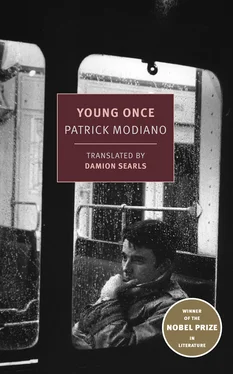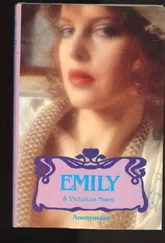Patrick Modiano
Young Once
PATRICK MODIANO was born in the Boulogne-Billancourt suburb of Paris near the end of the Nazi occupation of France. He studied at the Lycée Henri-IV and the Sorbonne. As a teenager he took geometry lessons with the writer Raymond Queneau, who would play a key role in his development. He has written more than thirty works of fiction, including novels, children’s books, and the screenplay for Louis Malle’s film Lacombe, Lucien . In 2014, Modiano won the Nobel Prize in Literature.
DAMION SEARLS has translated many classic twentieth-century writers, including Marcel Proust, Rainer Maria Rilke, Elfriede Jelinek, Christa Wolf, Hans Keilson, and Hermann Hesse. For NYRB Classics, he edited Henry David Thoreau’s The Journal: 1837–1861 and has translated Nescio, Nietzsche, Robert Walser, Alfred Döblin, and André Gide. He is currently writing a book about Hermann Rorschach and the cultural history of the Rorschach test.
For Rudy
For Zina
For Marie
THE CHILDREN are playing in the garden. Soon it will be time for the daily chess game.
“He’s getting his cast off tomorrow morning,” Odile says.
She and Louis are sitting on the deck of the chalet and watching from afar as their daughter and son run across the lawn with Viterdo’s three children. Their son is five, with a cast on his left arm, but it doesn’t seem to bother him.
“How long has it been?” Louis asks.
“Almost a month.”
He had slipped off a swing, and it had been almost a week before they realized he had a fracture.
“I’m going to take my bath,” Odile says.
She goes upstairs to the second floor. When she gets back, they will start their chess game. He hears the bathwater running.
On the other side of the road, behind the row of pine trees, the funicular terminal looks like a spa’s little train station. One of the first cable cars built in France, apparently. Louis follows it with his eyes as it slowly climbs the slope of the Foraz, and the vivid red of its cabin cuts into the green of the summery mountainside. The children had dodged around the pines and now they are riding their bikes on the shady roundabout next to the terminal.
Yesterday, Louis had taken a large wooden plaque off the outside of the chalet, the one on which he had written, in white letters, SUNNY HOME. It lay on the ground behind the French window. It was twelve years ago that they bought the chalet and turned it into a kids’ camp, and they had not known what to call it. Odile wanted a French name — Les Lutins, Les Diablerets — but Louis thought an English name was classier and would attract more customers. They ended up going with Sunny Home.
He picks up the wooden sign. Sunny Home. He’ll put it away in a drawer soon. He feels relieved. The children’s home, that’s over now. Starting tomorrow, they will have the chalet for themselves. He’ll turn the shed at the far end of the garden into a restaurant and teahouse where people can stop in during the winter, before taking the funicular.
Darkness rises up, little by little, from the bottom of the valley and the far end of the garden, along with the screams and laughter of the children now playing hide and seek. Tomorrow, June 23, is Odile’s thirty-fifth birthday. And next month it will be his turn: He will be turning thirty-five as well. He’d invited the Viterdos and their children to the chalet for Odile’s birthday, as well as Allard, the old skier who runs a small sports store.
The red funicular has started down the mountainside and it disappears behind a mass of pine trees, then reappears, following its path at the same calm speed. They will see it climb back up and descend back down until nine p.m.; the last time, it will be nothing but a fat firefly sliding along the face of the Foraz.
•
“Don’t be scared, my boy.”
The doctor patted the child’s cheek. Odile was the one who was nervous. The doctor, with a device spinning as fast as a circular saw used for cutting logs, started to split open the cast where Odile had drawn flowers. And the boy’s arm suddenly appeared, intact. The skin was not dry or pale, as Odile had feared. The boy moved his arm, bent it gently, not really believing it, a watchful smile on his lips.
“Now you can go break it again,” the doctor had said.
She had promised him an ice cream before they went back up to the chalet, and they sat down face to face at an outdoor café by the lake. The child chose pistachio-strawberry.
“Are you glad you don’t have your cast anymore?”
He didn’t answer. He ate his ice cream, his face serious with concentration.
She looked at him and wondered if he would remember, later, that cast dotted with flowers. His first memory of childhood? He squinted in the sun. The mist was blowing away on the lake and it was her thirty-fifth birthday. And soon Louis would be thirty-five too. Could anything new happen to them, at thirty-five? She wondered, thinking about the intact skin on the boy’s arm suddenly appearing from under the cast; it was like the arm was what had broken open the hard shell they had encased it in. Does life ever start over at thirty-five? A serious question, which made her smile. She would have to ask Louis. She had the feeling that the answer was no. You reach a zone of total calm and the paddleboat glides all by itself across a lake like the one stretching out before her. And the children grow up. They leave you.
An eyelash at the corner of her eye was bothering her and she reached into her bag for an empty compact she kept solely for its little round mirror. She couldn’t get the lash, and she scrutinized her face. It hadn’t changed. She had the same face as when she was twenty. The tiny wrinkles at the corners of her mouth hadn’t been there back then, but the rest was the same, yes… And Louis had not changed either. He was a little thinner, that’s all…
“Happy birthday, Mama.”
He said it stumbling over the words, but with a certain pride. She hugged him. How strange it would be if children knew their parents the way they were before the children were born, when they were not yet parents but simply themselves. Her childhood, with her grandmother in Paris, on rue Charles-Cros, where the bus lines started. A little farther on, the gray building of the Tourelles swimming pool, the movie theater, the slope of boulevard Sérurier. With a little imagination, that hill on misty, sunny mornings was a steep cliffside road, leading down to the ocean.
“We have to go home now.”
Driving the car on the road up to the chalet, her son sitting next to her, Odile hummed a tune, something or other, without thinking about it. Before long, she realized that it was the first bars of an operetta she had found, to her great surprise, at a used-record store in Geneva: Hawaii Rose …
•
They are sitting on the green bench in front of the funicular terminal, and their son is riding his bicycle around the roundabout. It has training wheels. Odile is stretched out with her head on Louis’s knee, reading a movie magazine.
The child moves through the patches of sunlight one by one, then restarts what he calls his “grand tour.” He stops every so often to pick up a pinecone. The cable-car operator is smoking a cigarette in the doorway to the building, and he looks like a stationmaster with his blue cap and uniform.
“So, how’s it going?” Louis says.
“Not many customers today.”
It didn’t matter. Even empty, the red funicular would leave on schedule. That was the rule.
“Even though it’s sunny,” the operator says.
Читать дальше












